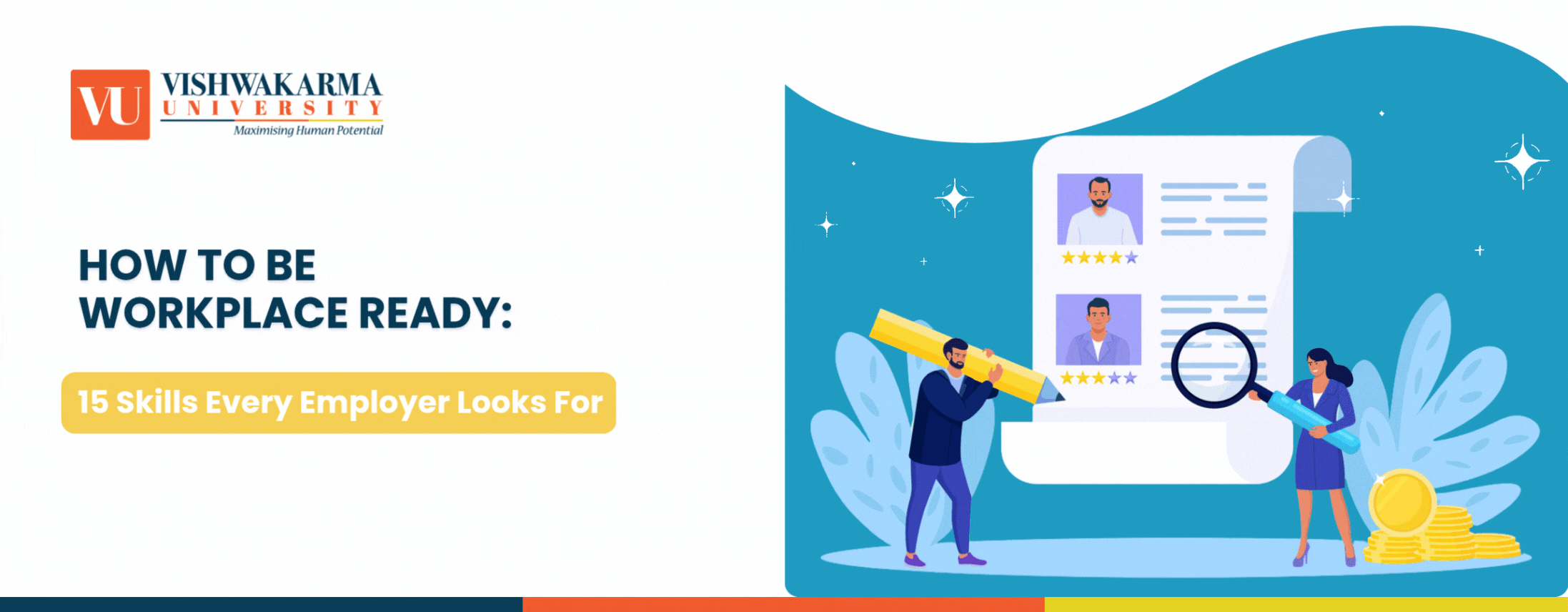Employers want graduates who can think, adapt, collaborate, and communicate; basically, people who are job-ready from day one. Whether you’re dreaming of a corporate role, a creative career, or your own startup, developing the right employability skills while in college can make all the difference.
Let’s dive into the top 15 skills employers look for in college graduates, along with a few practical ways to build them while you’re still in college.

1. Critical Thinking and Problem-Solving

Every employer values graduates who can think on their feet. Being able to analyze a situation, evaluate options, and find solutions, that’s what makes you stand out.
Fact: According to the World Economic Forum’s Future of Jobs Report (2023), critical thinking is among the top 3 in-demand skills worldwide.
How to develop it: Join case competitions, participate in hackathons, or take up research projects that challenge your logic and creativity.
2. Communication Skills

Clear communication is everything, from writing emails to presenting ideas in meetings. Many fresh graduates struggle here, which can cost them opportunities.
Pro Tip: Practice public speaking through college clubs, or record yourself explaining a concept; it’s surprisingly effective. Participate in such clubs through Vishwakarma University, Pune.
3. Teamwork and Collaboration

Workplaces thrive on collaboration. Whether you’re designing an app or managing a campaign, teamwork drives results.
How to build it: Group assignments and student clubs are your training grounds. Learn to listen, share credit, and resolve conflicts gracefully.
4. Digital Literacy

We live in a tech-driven world, so whether it’s Excel, Google Workspace, Canva, or data analytics tools, digital literacy is non-negotiable.
Fact: A NACE (National Association of Colleges and Employers) study found that over 90% of employers value graduates with strong digital skills.
How to build it: Enroll in short online courses or explore tools relevant to your field.
5. Time Management

In a busy workplace, deadlines rule everything. Managing your time well shows reliability and professionalism.
Try this: Use planners, Pomodoro timers, or apps like Notion or Todoist to organize your day. The earlier you build this habit, the better!
6. Creativity and Innovation

Automation is everywhere, but creativity? That’s human. Employers love fresh thinkers who bring new ideas to the table.
Practice it: Start a passion project, join a design challenge, or brainstorm new ways to improve campus life.
7. Technical and Analytical Skills

Whether it’s learning data analysis, coding, or financial modeling, technical skills add serious weight to your resume.
Example: Even if you’re not from a tech background, learning tools like Excel or Tableau can boost your job readiness instantly.
8. Emotional Intelligence (EQ)

EQ is your ability to manage emotions; your own and others’. In workplaces where teamwork and communication are key, EQ is often more important than IQ!
Fact: TalentSmart research shows that 90% of top performers have high emotional intelligence.
Build it: Practice empathy, self-awareness, and active listening in your daily interactions.
9. Adaptability and Flexibility

The modern workplace changes fast: new tools, new rules, new goals. Being adaptable makes you future-proof.
How to showcase it: Mention internships or experiences where you had to quickly learn or pivot. Employers love those stories.
10. Leadership Skills

Leadership isn’t just for managers, it’s about taking initiative. Employers notice when you step up and drive results.
In college: Lead a club, organize an event, or mentor juniors. These experiences demonstrate leadership beautifully on your resume.
11. Cross-Cultural and Global Awareness

As workplaces become more global, understanding diverse perspectives is a must.
How to gain it: Collaborate with international students, take online courses with global peers, or attend cultural exchange events.
12. Decision-Making Skills

Employers trust graduates who can make informed, data-backed decisions, not just guesswork.
Tip: Learn to use frameworks like SWOT or Pareto analysis for making smart, structured choices.
13. Research and Information Management

Whether it’s analyzing data or writing reports, knowing how to find and evaluate reliable information is a key graduate skill.
In college: Use academic databases or tools like Google Scholar for your projects, it’ll sharpen your analytical edge.
14. Presentation and Public Speaking

Your ideas deserve to be heard! Employers value graduates who can present confidently and engage their audience.
Pro Tip: Practice storytelling, it’s the secret sauce of every great presentation.
15. Work Ethic and Professionalism

Punctuality, accountability, and integrity never go out of style. Employers consistently rank these among the top skills for graduates.
Show it through: consistent attendance, reliable project work, and respect for deadlines; habits that translate directly to the workplace.
Summary: The Skills Employers Want Most
|
Skill Type |
Examples |
Why It Matters |
|
Soft Skills |
Communication, Teamwork, Emotional Intelligence |
Builds relationships & collaboration |
|
Hard Skills |
Data Analysis, Digital tools, Financial Modeling |
Demonstrates technical competence |
|
Transferable Skills |
Time Management, Problem-Solving, Adaptability |
Keeps you agile in dynamic roles |
How Vishwakarma University Helps You Build These Skills
At Vishwakarma University, learning goes beyond classrooms. Through industry-linked programs, live projects, and soft-skill workshops, students develop the exact skills that hiring managers look for.
Whether it’s mastering data analytics, pursuing BBA or MBA programs, improving communication through media and design courses, or learning leadership through hands-on entrepreneurship initiatives, VU ensures you graduate not just with a degree, but with career readiness regardless of your field.
Final Takeaway:
The job market will keep evolving, but if you keep learning, stay adaptable, and work on these top skills, you’ll always stay ahead of the curve.
So start now, your future employer is already looking for the skills you can build today!
Further Reading:
LinkedIn Learning: Most In-Demand Skills 2024




